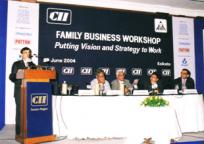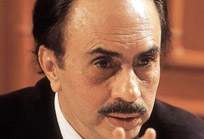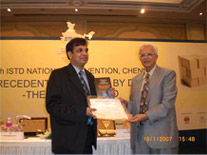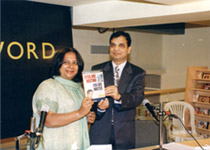Media

Eminent economists to attend ICAI seminar
BY A STAFF REPORTER
30 September 2004
ABU DHABI - The annual conference of the Abu Dhabi Chapter of the Institute of Chartered Accountants of India (ICAI) will focus on the theme 'Agile Business in Fragile Times' at its two-day annual international seminar beginning today in the capital.
Eminent economists and captains of industry from India will address the gathering that will be attended by delegates from the chapters of Institutes of Chartered Accountants of India from Al Ain, Bahrain, Muscat and Saudi Arabia.
The speakers include F.C. Kohli, former deputy chairman of Tata Consultancy Services and widely regarded as the father of Indian IT, who will deliver the keynote address, Mohammed Abdul Jalil Al Fahim, Chairman of Al Fahim Group and Rajesh Jain, management consultant. Among topics slated in the agenda are redefining accountancy profession, role of behavioural finance, stock exchange decisions, trends in management and role of IT and family firms - challenges and opportunities.
K.S. Achar, Chairman of Abu Dhabi Chapter of ICAI, that is a member of the Indian Business/Professional Group, said that the Institute, founded in 1984, today has 300 members on its rolls. The international seminar awards ten Continuous Professional Education (CPE) hours for participation which is mandatory for the annual renewal of membership, he said.
As this year marks two decades of the founding of ICAI, a function has been arranged on the occasion to felicitate past chairmen of the Institute.
Welcome relief from serious deliberations will come in the form of an entertainment programme; the highlights of which are magic and mimicry shows. Khaleej Times is the media sponsor of the event.

3 Generations of CII Leadership assemble in Kolkata, on Family Business (29 Jun, 2004)
Only 3% of family-owned businesses survive in its 3rd generation. To ensure survival and growth of the family business, it is critical to ensure open-communication within the family members; and to spend as much time managing 'the family', as one spends in managing 'the business'. This message came out strongly in an address by the Past Chairman of CII's Family Business Council, Mr M V Subbiah. He was addressing in Kolkata, on 'Family Business - Staying together over Generations'.
Participating in this first-off workshop on Family Business in Kolkata today, three Past Presidents of CII - Mr M V Subbiah, Mr Subodh Bhargava and Mr Sanjiv Goenka shared their perspectives on the issues and challenges facing family-owned businesses. The 3 Past Presidents assembling in Kolkata were from 3 different decades of CII leadership - 80s (Mr Subbiah), 90s (Mr Bhargava) and the current decade (Mr Goenka).
"For businesses to survive through generations, investing time in the family is very important. Dialoguing helps the family to understand its dynamics and complexities, and is most essential while managing family and family-business affairs," stated Mr M V Subbiah at the Inaugural of this workshop.
Speaking on the different aspects of family businesses, Mr Subbiah encouraged families to develop formal codes of conduct incorporating core family values; vision; and mission statements similar to business policies and constitutions that could be handed over to future generations.
Owners, family and business were three dimensions that needed to be balanced for continuity of the business. Performance evaluation systems for family members needed to be formalized to make the process seamless. Transparency in business, also added value to a family-owned business, stated Mr Subbiah.
According to Mr Sanjiv Goenka, ownership did not necessarily mean management. Ownership could secure a role but could not determine leadership. Competence and qualifications of family members were equally important in family enterprises. Mr Goenka spoke about the issue of the very survival of family businesses; and also the role of a strong leadership in the growth of the family business.
Mr Subodh Bhargava elaborated on the role of external members in family run businesses. Professionals working in a family enterprise could aid in family cohesiveness that helped in managing the business relations with members. However, it was also important to articulate the separate roles of the owner and the professional CEO. The professional and cultural values of the non-family executive should also match those of the family.
Dr Ranjan Das, Professor, IIM Calcutta, spoke on Family Governance Issues; and Mr Rajesh Jain, Editor, Roots & Wings, on Succession Planning. Also present, among others was Past President, CII, Mr Rajive Kaul.
This workshop saw over 130 delegates attending.
Kolkata
29 June 2004
ENTERING YOUR FAMILY OWNED BUSINESS: LESSONS FOR YOUNG ENTREPRENEURS
- MR RAJESH JAIN
(5th August 2005)
Mr Rajesh Jain of Janus Advisory Services while addressing a meeting on 'Entering Your Family Owned Business: Lessons for Young Entrepreneurs' mentioned that businesses succeed only if they adapt to changing technologies and to competitive international business environment.
Mr Jain mentioned that in an ever changing world of business, you can either choose the way upward, or downward, but you cannot choose to retain status quo for your business.
If a first generation industrialist, who had succeeded in building up a family-owned business, brick by brick, by persevering, cutting corners, saving every pie and by taking advantage of protective provisions of pre-liberalization fiscal regime, thinks that he can ensure continued success of his business by following the same conservative policies, he is grossly mistaken. If he fails to adapt to the changes in environment and plan to grow, his business will begin to decline instantaneously. A status quo policy in business is doomed to failure," he said.
Refering to his firm's insignia of Janus, the two-faced Roman god with one face turned towards past and the other to towards future, he said the key to perpetuating a success story lay in skilfully and proactively combining the values and wisdom acquired from the past with fast-changing needs and realities of the unfolding future. It is in this context that frequently frictions arose between the first, second and third generation members of many business families, he said.
The second and third generation members of business families should realize that old values gained from the past experience could be great source of strength, if skilfully adapted to the changing situations of the future. However, on the other hand, blind adoption of the past systems to cope with future needs was a sure way to decadence.
He said that more than 70% of the world's GDP came from the family-owned enterprises. Though in post-Independence India the government planned to make the public sector undertakings (PSUs) as commanding heights of the economy, it discarded the plan after four decades when it realized the endemic flaws of the system.
He said the families owning businesses were required to be highly resourceful and adaptable, because the members were required to cope with the triple tasks of keeping the families intact, while honestly serving the shareholders who were the real owners of their companies and also providing for maximum growth their businesses in a competitive environment.
Mr Jain said that it is not unoften that many members of the business families act subjectively and fail to see the larger picture. A family business can thrive and the individual growth potential of family members can be fully realized only if the members appreciate the fact that there can be only one true leader and that different members are endowed with different levels of skills and managerial competencies. The members have to do a lot of heart-searching and recognize their own emotional and intellectual limitations, while appreciating the different levels of competencies of other members. They must learn to separate business issues from family issues. Longevity and survival rate of family firms depend the maturity of family members.
He said there were numerous family businesses both in India and abroad that defied the logic behind the time-tested Rajasthani adage, 'haveli ki umar saath saal', and held together for many generations and kept thriving facing all odds.
The odds in their way were:
- Over-caution resulting in no reinvestment in innovation,
- Incapability of many first generation businessmen, who were accustomed to hands-on way of working, to delegate responsibilities to others and trust them to deliver, as their businesses grow..
- Having achieved some success through dint of hard work and hands-on approach, the first generation businessmen were naturally tended to be conservative, and opted for maintaining status quo instead of venturing on to risky unfamiliar grounds which held promises of growth.
- Lack of adaptability,
- Emotional attachment with the past,
- Failure to redefine and strengthen relationship with stakeholders,
- Poor marketing skills due to 'penny wise pound foolish' attitude,
- Giving more importance to loyalty than to competence,
- Excessive emotional involvement,
- Reluctance to take a turn, owing to a desire to extend the past;
- Failure to let go at the right time, and
- Poor management of family affairs..
Mr Rajesh Jain said the first generation businessmen had indeed many sterling attributes, which needed to be cherished by succeeding generations. Among such attributes were:-
- Strong personality,
- Strong commitment to values,
- Hands-on way of functioning,
- Intuitive approach to business,
- Respect for loyalty,
- Informal way of dealing,
- Conservative values, and
- a spirit of independence.
He said the some positive attributes of second generation members of business families were:-
- Contemporary knowledge,
- System orientation,
- Desire for automation,
- Willingness to invest, and
- Diverse interests;
Their negative attributes included:
- Lack of patience,
- Poor financial discipline, and
- Low loyalty to relationships,
Mr Jain recommended that a second or third generation member should work three to five years in any other companies, before joining the family business, because it helps:-
- To test his capabilities,
- To develop confidence without help from the family name,
- To develop capacity for independent survival,
- To learn to take criticism,
- To learn from own mistakes,
- To get used to being evaluated ,
- To make all the initial mistakes elsewhere,
- To learn punctuality, discipline and delivery of service,
- To learn to live within modest means,
- To understand and appreciate the feelings of and emotions of employees,
- To bring a new perspective from outside when he would join family business,
- To develop network, and
- To be able to earn respect from professional managers of own company, after proving one's worth in other companies.
Mr Rajesh Jain suggested the following entry level exercises for the second and third generation members:-
- Prepare a SWOT analysis of family business,
- Prepare a business plan,
- Prepare a report 'My Company After Five Years,'
- Prepare an analysis of the company's competitiveness;
- Prepare a profile of customers,
- Prepare a report on possibilities of technological adaptation,
- Prepare a report on possibilities for cost cutting,
- Prepare a report on scope for process simplification ' speedy processes.
"If we have poor control on processes involved, it will be difficult for us to deliver quality products and services in a sustainable way. He advised the second generation young entrepreneurs to count their blessings. You have the power of an elephant. Since there is a price for everything, choose when you want to pay it. But according to me, paying first and enjoying later in leisure is far better than enjoying first and paying later for it. Mr Rajesh Shah, who has authored the book, "Gods are Meeting, You are Invited", said the title referred to the Roman god Janus whose one face looked towards past and the other looked towards future for deriving the best from both the worlds. "And this where you are all invited," he told the young entrepreneurs.


Poem on family buisness by Nadir Godrej
Family Business
A poem by Nadir Godrej
Now family businesses aren't so rare,
In fact they spring up everywhere,
But very few are known to last,
Most disappear very fast.
Some last throughout the founder's life.
Some end in acrimonious strife.
Two generations is pretty good
And yet it should be understood
That very few can last for three.
But all of us can clearly see
That some go on for years and years
And out-compete their many peers.
And what is it that gives them strength?
I could go on, like this, at length
But it will suffice now to say
That family businesses learn to stay
Because they take the long term view
That professionals so rarely do.
But family businesses need a head
And when the leader's ill or dead
We need someone else instead.
The business has to be well led.
The family may have an heir
But he or she may not care
Or even have the needed skill
Successfully to fulfil
The tasks a leader's role demands.
And so before the business lands
Into unskilled, unwilling hands,
I'm sure you'll all agree it stands
To reason that we must all plan
That the business gets the woman or man
That's best for it to thrive and grow.
For those who study families know
Successions must take in account
Perhaps in an equal amount
The business needs, the family,
The management, not one, all three.
The business needs a strategic plan.
Rules are required for the clan
That bear in mind that they have goals
And specify what are their roles.
A succession plan is a must,
It makes no sense to suddenly thrust
An ill prepared elder son
Into the role of number one.
The heir should be planned and groomed
Or else the business will be doomed.
© All rights reserved. Originally published with permission in November 2002 issue of Roots 'n Wings.



There are many good thoughts in the book

more...

